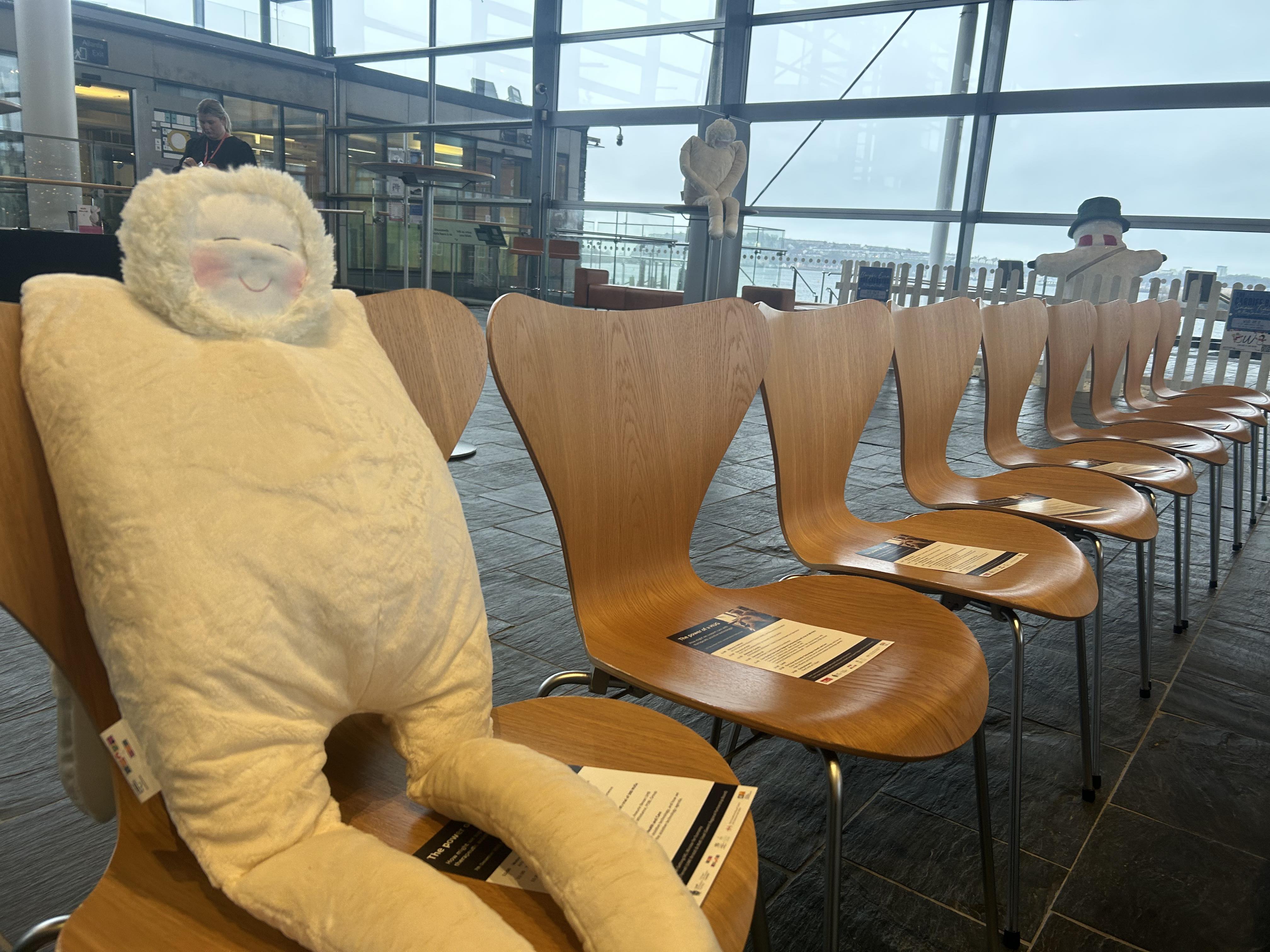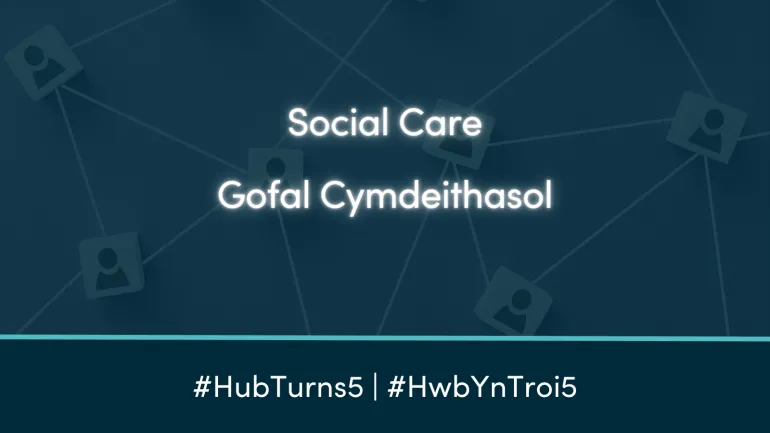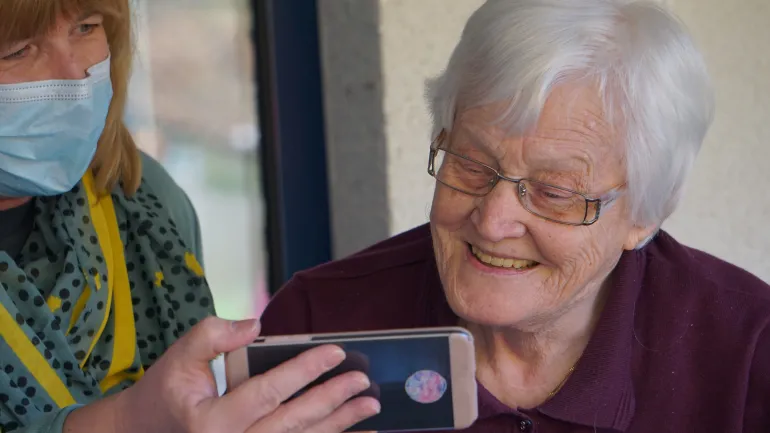It’s hard to underestimate the power of a good hug. An inspiring event at the Senedd recently shone a light on HUG by LAUGH, a therapeutic comforter, and how this assistive technology is transforming the well-being of people with dementia and additional learning needs, as well as supporting people working and volunteering in the social care sector and NHS.

Harnessing the power and potential of assistive technology like HUGs can help us to transform care for the better. But what is a HUG? It’s a soft comforter with weighted limbs to make it feel like a real cuddle. It also has a simulated beating heart and music player inside that plays a person’s favourite music. This physical contact and sensory stimulation helps to evoke comfort, reassurance and connection; improving wellbeing for people with dementia and additional learning needs.
The Welsh Government-sponsored Senedd event, which Life Sciences Hub Wales was delighted to support, welcomed people from health and social care, charities, academia, government, and most importantly, those with direct experience of using HUGs to improve wellbeing. This blog highlights some of the incredible stories heard, alongside thought-provoking conversations on the challenges and opportunities of using assistive technology in health and social care.
The story so far
We heard from Professor Cathy Treadway and Dr Jac Fennell, who are co-founders of HUG by LAUGH, about their journey in designing, developing and providing HUGs to people in south Wales and beyond. They were initially created as part of Prof Treadaway’s AHRC-funded LAUGH research project at Cardiff Metropolitan University, and subsequent research by Dr Fennell at UWE Bristol.
An international research team worked closely with those with lived experience and used compassionate design methodology to create innovative playful products that amuse, comfort, engage and bring joy for people with advanced dementia.
Focusing on the importance of sensory stimulation, the original HUG prototype was designed for someone with dementia in end-of-life care. They were bed bound and non-verbal but after the introduction of the HUG, the team saw huge improvements in their ability to verbalise and their general wellbeing. For this person, the HUG gave them a feeling of connection and sense of self.
Seeing its potential, the team wondered if it could have the same powerful effect on others. A larger Welsh Government-funded study, LAUGH EMPOWERED, saw them distributed in nursing homes and hospitals, with a whopping 87% increase in well-being after six months found.
HUG is now available through a Cardiff Met spin-out company, going from prototype to product with support from Alzheimer’s Society. It’s now available worldwide and has travelled as far as Australia, Canada and Scandinavia.
Giving a HUG to those who need them
Soothing. Calming. More connected. These were some of the words used to describe how HUGs offered support throughout the day. And learning about this first hand from people who’ve seen the direct benefit from a HUG was a really powerful part of the day.
We heard from Chris Maddocks, Alzheimer’s Society Trustee and Expert by Experience, who lives with dementia. She shared her perspectives on the importance of lived experience in shaping change alongside the impact that HUG has had on her. The first time she had one in her arms the slow heartbeat and feeling of being cuddled took her back to comforting childhood memories. She spoke about how powerful this positive sentiment was for her and that HUGs should be for use any time and not just for end-of-life care.
Suzy Webster, Lived Experience Co-ordinator for Dementia UK, also shared her first-hand experience of the support HUGs can bring through the powerful story of her Mum. The HUG was such an important tool it became part of the family’s everyday life – giving her Mum comfort, joy and a sense of purpose.
A panel chaired by Matt Lloyd, Prevention and Well-being Programme Manager at Gwent Regional Partnership Board, offered a fantastic insight into a few different ways HUGs can support. Gwent Regional Partnership Board funded the evaluation of HUGs across the region in environments including hospitals, care homes, assisted living services and in schools.
Sophie Foote, Mapping, Education and Carers Service (MECS) Practitioner at Aneurin Bevan University Health Board, shared how a HUG was a powerful non-pharmacological intervention for dementia. One example was providing not only comfort for a lady with dementia but also invaluable respite for her husband when they visited a day centre, as the HUG provided reassurance and improved her overall well-being when he wasn’t there.
We also learned how HUGs can support people with learning disabilities. Melanie Vale, Head Occupational Therapist for Learning Disabilities and Graham Sellwood, Occupational Therapy Technician, from Aneurin Bevan University Health Board, explored how HUGs in NHS residential facilities offered a positive reinforcement of feeling and connection – particularly after the Covid-19 pandemic where many have felt isolated.
Lynne Whistance from Pobl spoke on how introducing the HUG as a normal everyday item helped service users to accept it quickly. People who benefitted included someone who was non-verbal who then started talking to the HUG and someone with anxiety and depression who got a great deal of confidence from the HUG.
The future of assistive technology in care
There were lots of thought-provoking conversations in the afternoon discussion exploring assistive technology. An important theme was the need to keep things playful and make people feel they have the license to do this – whether that’s staff, service users or family members. Reducing fear of judgment through an inclusive environment helps people to embrace the potential of assistive technology.
Ensuring we embed a preventative approach into using assistive technology was also flagged as a key focus. Tools like HUGs can play a massively positive role in care as earlier talks showed; if deployed earlier in someone’s pathway they can help boost vital things like well-being at an earlier point.
Collaboration was also highlighted as a major priority – of which HUG is a brilliant example. We can deliver change more easily when drawing on the experience, resource and strengths of partners from diverse backgrounds.
It was an inspiring day of discussions that centred user experience at the heart of everything. We’re really looking forward to continuing to follow HUG’s journey as assistive technology continues to be a positive force for change in Wales and beyond.
Learn more about how Life Sciences Hub Wales can support partners in social care.
The Power of a HUG event was organised by the University of the West of England (UWE Bristol), the Gwent Regional Partnership Board, Cardiff Metropolitan University, Life Sciences Hub and supported by an Arts & Humanities Research Council Impact Accelerator Award.



